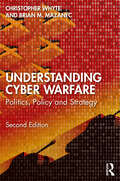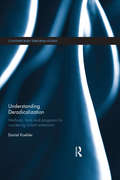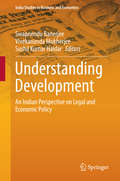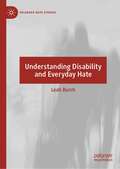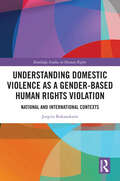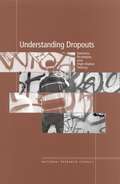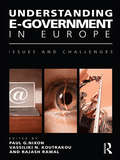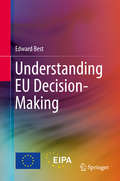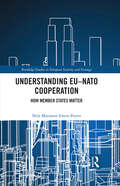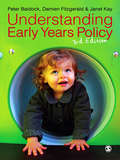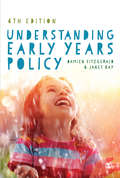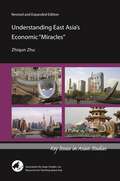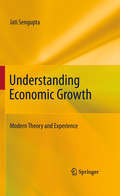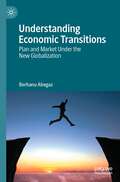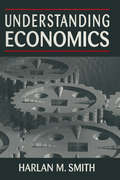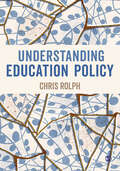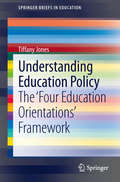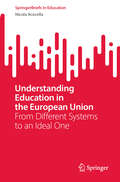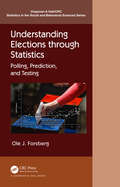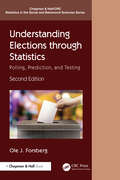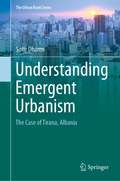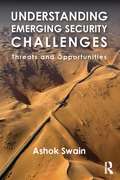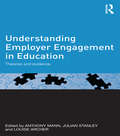- Table View
- List View
Understanding Cyber-Warfare: Politics, Policy and Strategy
by Christopher Whyte Brian M. MazanecThis textbook offers an accessible introduction to the historical, technical, and strategic context of global cyber conflict. The second edition has been revised and updated throughout, with three new chapters. Cyber warfare involves issues of doctrine, strategy, policy, international relations (IR) and operational practice associated with computer network attack, computer network exploitation and computer network defense. However, it is conducted within complex sociopolitical settings alongside related forms of digital contestation. This book provides students with a comprehensive perspective on the technical, strategic and policy issues associated with cyber conflict, as well as an introduction to key state and non-state actors. Specifically, the book provides a comprehensive overview of several key issue areas: The historical context of the emergence and evolution of cyber warfare, including the basic characteristics and methods of computer network attack, exploitation and defense; An interdisciplinary set of theoretical perspectives on conflict in the digital age from the point of view of the fields of IR, security studies, psychology and science, technology and society (STS) studies; Current national perspectives, policies, doctrines and strategies relevant to cyber warfare; An examination of key challenges in international law, norm development and deterrence; and The role of emerging information technologies like artificial intelligence and quantum computing in shaping the dynamics of global cyber conflict. This textbook will be essential reading for students of cybersecurity/cyber conflict and information warfare, and highly recommended for students of intelligence studies, security and strategic studies, defense policy, and IR in general.
Understanding Deradicalization: Methods, Tools and Programs for Countering Violent Extremism (Contemporary Terrorism Studies)
by Daniel KoehlerThis book provides a comprehensive guide to the different aspects of deradicalization theories, programs and methods. It analyzes the practical and theoretical aspects of deradicalization programs and the methods being employed to bring extremists and terrorist back to a non-violent life. The book includes in-depth case studies on programs and former extremists, including interviews with former German neo-Nazis and families of Jihadists who have received deradicalization counselling. Using a coherent theory of radicalization and deradicalization, it integrates existing programs into a typology and methodology regarding the effects and concepts behind deradicalization. In addition, a current state of the art assessment of deradicalization programs around the world provides a collection of programs and landscapes worldwide. It thereby functions as a unique guide for practitioners and policymakers in need of evaluation or construction of such programs, as well as a resource pool for academics interested in research about deradicalization programs and processes. The major aim of this book is to consolidate the existing scholarship on deradicalization and to move the field forward by proposing a coherent theory of deradicalization, including ways to measure effectiveness, standard methods and procedures, different actors of such programs and cooperation on national and international level. In essence, this work enables the reader to identify how, when and why deradicalization programs work, how they can be built and structured, and to identify their limitations. This book will be of interest to students of radicalisation, counter-terrorism, radical Islam, criminology, security studies and IR.
Understanding Development
by Swapnendu Banerjee Vivekananda Mukherjee Sushil Kumar HaldarThis book addresses topical development issues in India, ranging from land acquisition, poverty alleviation programs, labor market issues, the public-private partnership (PPP) model and fiscal federalism. It offers an Indian perspective on the dynamics of economic development and the impact the country's legal and public policies have on it. Economic development is a dynamic concept - old problems are solved, while at the same time new issues come to the fore. The emergence of these issues is unique to the development experience of an economy. The book includes sixteen recent contributions and is divided into four sections: law and contract; trade and foreign aid; issues in public economics; and the social sector and poverty alleviation. The chapters reflect on a number of development issues which were of concern for India in the recent past and will be important in her future development initiatives such as land acquisition, agricultural productivity, employment, protection of intellectual property rights, corruption, public-private partnership, regional development, poverty alleviations programs like the National Rural Employment Guarantee Act (NREGA) and the training of self-help group members, health and education of women, to name a few. The book is a valuable reference resource for policy practitioners and researchers working on the economics of development with special focus on developing economies.
Understanding Disability and Everyday Hate (Palgrave Hate Studies)
by Leah BurchThis book examines disability hate crime. It focusses on key questions concerning the ways in which hate is understood and experienced within the context of the everyday, in addition to the unique ways that hate can hurt and be resisted. It introduces readers to questions surrounding the conceptual framework of hate and policy context in England and Wales, and extends these discussions to center upon the experiences of disabled people. It presents a conceptual reconsideration of hate crime that connects hate, disability and everyday lives and spaces using an affective (embodied and emotional) understanding of these experiences. Drawing on empirical data, this framework helps to attend to the diverse ways that disabled people negotiate, respond to, and resist hate within the context of their everyday lives. The book argues that the affective capacity of disabled people can be enhanced through their reflections upon hateful experiences and general experiences of navigating a disabling social world. By working with the concept of ‘affective possibility’, this book offers a more affirmative approach to harnessing the everyday forms of resistance already present within disabled people’s lives. It speaks to academics, students, and practitioners interested in disability, affect studies, hate crime studies, sociology, and criminology.
Understanding Domestic Violence as a Gender-based Human Rights Violation: National and International contexts (Routledge Studies in Human Rights)
by Jurgita BukauskaiteExamining the prevalent issue of domestic violence, this book breaks down the reasons behind the ineffectiveness of existing human rights instruments and the gaps in current legal systems failing those in need. Through a variety of key case studies, it reveals significant gaps in the legal conceptualisation of domestic violence between human rights standards on the one hand and the national legal systems examined—those of Ireland and Lithuania—on the other. The book reveals that, contrary to gender-based universal human rights approaches and despite recent legislative reforms, the legal concept of domestic violence is gender-blind. It fails to capture gender-based empirical realities on the ground, rendering national legal systems devoid of an empirically informed theoretical basis for addressing the problem. Despite the differences in the contextual backgrounds of the two case study countries, the legislation on domestic violence is underpinned by patriarchal beliefs in both. This book employs a gender-based examination of the issue that will be of key interest to scholars, legal practitioners, civil society actors, and students of feminist legal theory, gender equality, gender in international law, gender and human rights and conceptual democracy.
Understanding Dropouts: Statistics, Strategies, and High-Stakes Testing
by Committee on Educational Excellence Testing EquityA report on Statistics, Strategies, and High-Stakes Testing
Understanding E-Government in Europe: Issues and Challenges
by Paul G. Nixon Vassiliki N. Koutrakou Rajash RawalThis volume critically explores the contentions in the emerging debate surrounding new media technologies and the extent to which they are challenging traditional political and government models. Examining a range of citizen/government interactions which together form e-government in different contexts, this book assesses the potential of new media technologies to facilitate new institutional patterns for governance and participation, as experienced primarily, but not only, across Europe. Analysing a range of challenges spanning from those of a technological and conceptual nature to those of a more political and legal nature, the authors scrutinise the central policies at governmental and organisational levels and consider the following questions: Is society driving or responding to e-government and is it ready to cope with it? What implications does e-government have for the power/democracy relationship? Is the technology right for e-government? What is needed to ensure government services are delivered optimally? How is e-government perceived and is it trusted? How are the sensitive issues of identity, privacy and social inclusion dealt with? How are management and safety dealt with when one considers issues such as activism, cyberterrorism, biometrics, and new implications for international relations? This comprehensive text will be of interest to students and scholars of public policy, politics, media and communication studies, sociology, law and European studies. It will also offer insights of relevance to practitioners and policy-makers in regional, national, and transnational governance, reform and innovation.
Understanding EU Decision-Making
by Edward BestThis book presents in a concise and accessible way why the EU institutional system exists in its present form, how the EU fits into the world as a system of governance, and who is involved in EU policy processes. It outlines the historical context which has shaped the EU system, gives a summary of the system's basic principles and structures, and describes its actors, procedures and instruments. The main theme is to show that EU decision-making is not just a matter of action at some higher and separate level, of 'them and us', but rather that it involves different forms of cooperation between European, national and regional authorities, as well as interaction between public and private actors. Numerous short case studies illustrate how people's day-to-day activities are affected by EU decisions, and how individuals' concerns are represented in the decision-making process. The book provides insights and examples which will be very helpful for all students of European integration. It will also be a valuable resource for European citizens wishing to understand the basic realities and rationales, as well as some of the dilemmas, behind EU policy-making.
Understanding EU-NATO Cooperation: How Member-States Matter (Routledge Studies in European Security and Strategy)
by Nele Marianne Ewers-PetersThis book examines the development of cooperation between the EU and NATO, two key non-state actors in the European security architecture. The work examines the relationship between the EU and NATO by focusing on the perspective of member states. Highlighting the relevance of member states’ role in shaping EU-NATO relations, it conceptualises interorganisational cooperation and develops a typology of member states based on four types: advocates, blockers, balancers and neutrals. To apply this typology and analyse member states’ specific roles, the analysis considers their foreign and security policy orientations, bilateral relationships with other member states, and contributions to both military operations, and division of labour between the two organisations. The book also examines states’ use of political strategies -- such as forum-shopping, hostage-taking and brokering -- that influence the design, evolution and practicalities of cooperation between the EU and NATO. This book will be of much interest to students of European Security and Defence Policy, international organisations, and security studies in general.
Understanding Early Years Policy
by Peter Baldock Damien Fitzgerald Janet KayFully updated to include all the latest developments in early years policy such as the revised Early Years Foundation Stage (EYFS), this book explores how policy is made, implemented, analysed and developed over time. There is a complete overview of early years policy, and an evaluation of its ongoing impact on practice. Case studies, points for reflection and activities encourage discussion and critical thinking. <P><P> This Third Edition has been significantly updated to include:<P> - a new chapter on international early years policy<P> - discussion of the impact of the recession and the Coalition Government's policies<P> - material on how ordinary practitioners can influence policy<P> - a revised timeline of early years legislation.<P> This text is an essential read for early years students at all levels, and early years practitioners.<P> Peter Baldock worked extensively in Early Years education and was chair of the executive committees of two children's chartities based in Sheffield.<P> Damien Fitzgerald and Janet Kay are both Principal Lecturers in Childhood Studies at Sheffield Hallam University.
Understanding Early Years Policy
by Damien Fitzgerald Janet KayNow in its fourth edition, this bestselling textbook continues to provide fully updated coverage of all the latest developments in early years policy such as the revised Early Years Foundation Stage (EYFS), SEND Code of Practice 0-25 years and the Children and Families Act 2014. Exploring how policy is made, implemented, analysed and developed over time this book presents a complete overview of early years policy and an evaluation of its ongoing impact on practice. This Fourth Edition has been significantly updated to include: Full coverage of the 2010-2015 UK Coalition Government. A comprehensive timeline of Early Years policy Guidance on how to research policy for yourself More international case studies, now including the US and Scandinavia. New material on how to manage policy changes as a practitioner An expandedfocus of the devolved countries within the UK This text is an essential read for early years students at all levels, and early years practitioners.
Understanding Early Years Policy
by Damien Fitzgerald Janet KayPreviously known as Baldock: Understanding Early Years Policy is in its Fourth Edition. This best-selling textbook continues to provide fully updated coverage of all the latest developments in early years policy such as the revised Early Years Foundation Stage (EYFS), SEND Code of Practice 0-25 years and the Children and Families Act 2014. Exploring how policy is made, implemented, analysed and developed over time this book presents a complete overview of early years policy and an evaluation of its ongoing impact on practice. This Fourth Edition has been significantly updated to include: Full coverage of the 2010-2015 UK Coalition Government. A comprehensive timeline of Early Years policy Guidance on how to research policy for yourself More international case studies, now including the US and Scandinavia. New material on how to manage policy changes as a practitioner An expandedfocus of the devolved countries within the UK This text is an essential read for early years students at all levels, and early years practitioners.
Understanding East Asia's Economic "Miracles" (Key Issues in Asian Studies)
by Zhiqun ZhuRevised and Expanded Second Edition. Concise yet comprehensive, Zhiqun Zhu’s book is the perfect introduction to the political economy of East Asia for undergraduate and advanced high school classes. Zhu’s analysis of the economic ‘miracles’ of Japan, South Korea, China and Taiwan takes into account both domestic factors and the international environment, and is sensitive to the similarities as well as differences between the developmental experiences of these nations. Zhu raises important related issues such as the connections between economic development and democratization, the relative economic contributions of the state and the market, and the portability of the East Asian developmental model. East Asia’s diverse but dynamic experience is valuable precisely because it demonstrates that developing nations need not follow a single approach to prosperity. An excellent book to assign for courses on Asia.
Understanding Economic Growth
by Jati SenguptaModern economies have undergone a dramatic change. There has been a shift from large scale material manufacturing to the design and application of new technology with R&D and human capital. The new information age has introduced significant productivity gains through increasing returns and learning by doing, which has challenged the traditional growth models based on competitive market structures. Institutions outside the traditional markets and the genetic principle of survival of the fittest have dominated the current theory of industry growth. This book coordinates and integrates the two strands of economic growth and development: the endogenous theory of growth and the extra-market models of evolutionary economics dominated by innovation efficiency. It presents this new paradigm in terms of both theory and historical experiences. The book addresses the role of innovations and human capital, the impact of information technology, the role of institutions as mechanisms of evolutionary economies and the experiences of Asian growth miracles, and will be of interest to readers in economics and political science concerned with economic growth and development.
Understanding Economic Transitions: Plan and Market Under the New Globalization
by Berhanu AbegazUnderstanding Economic Transitions explains the genesis, operation, and transformation of the centrally-planned socialist economy, which figured prominently in the lives of billions of people in twentieth-century Europe and Asia. Just as importantly, the centrally-planned socialist economy’s demise coincided with the shift from nonindustrial to industrial economy (and de-industrialization in some cases) and the onset of ICT-driven globalization. Using theory, empirics, and selected country case studies, this book teases out the enduring lessons from the myriad and fraught pathways of transition from socialism to capitalism. Understanding Economic Transitions provides a self-contained, comprehensive, and authoritative treatment of modern economic systems. This textbook has four features of particular use to students: (i) Using the prism of comparative institutionalism, it melds theory and evidence to revisit the varieties of planned and market-driven systems today; (ii) It takes economic planning seriously in theory and practice (central, cooperative, or indicative) as the most prominent marker of the ever-changing boundaries between state and market; (iii) It focuses on the dynamics of systemic transition in formerly socialist countries by contextualizing them in terms of the whence (central planning), the how (modalities of transition), and the whither (illiberal or liberal capitalism) of politico-economic transformation; and (iv) It examines the profound impact on these structural processes of the post-1990 phase of economic globalization. With its clear, comprehensive content and useful pedagogical features, this textbook will prepare students to understand how economies transition and why.
Understanding Economics
by Harlan M. SmithThis accessible workbook has been developed to provide readers with a solid grounding in economic principles. It offers a critical examination of 40 economic theorems and concepts - such as wealth distribution, supply and demand and finance - and the contexts in which they should be understood.
Understanding Education Policy
by Chris RolphFrom academisation and free schools to workforce retention and curriculum change, education policy is a complicated, constantly evolving topic that sits at the heart of any academic study of education. This book offers a critical contextual analysis of education policy and the political ideas that drive policy. It maps a careful journey across the recent policy landscape in England looking at major areas of the education system such as: the curriculum, SEND, pedagogy and the school workforce. Analysis is informed by assessing the real-world impact and implications of government initiatives and by taking into account key contextual issues. Case studies from educational settings, supported by study questions to prompt your thinking, examine how key policy ideas operate in practice. This is the ideal overview of education policy for anyone studying Education Studies degrees at undergraduate level, trainee teachers seeking a deeper understanding of how policy affects the schools they will work in, and Master’s students wanting a clear primer on the subject. Chris Rolph is Director of the Nottingham Institute of Education, Nottingham Trent University.
Understanding Education Policy
by Chris RolphFrom academisation and free schools to workforce retention and curriculum change, education policy is a complicated, constantly evolving topic that sits at the heart of any academic study of education. This book offers a critical contextual analysis of education policy and the political ideas that drive policy. It maps a careful journey across the recent policy landscape in England looking at major areas of the education system such as: the curriculum, SEND, pedagogy and the school workforce. Analysis is informed by assessing the real-world impact and implications of government initiatives and by taking into account key contextual issues. Case studies from educational settings, supported by study questions to prompt your thinking, examine how key policy ideas operate in practice. This is the ideal overview of education policy for anyone studying Education Studies degrees at undergraduate level, trainee teachers seeking a deeper understanding of how policy affects the schools they will work in, and Master’s students wanting a clear primer on the subject. Chris Rolph is Director of the Nottingham Institute of Education, Nottingham Trent University.
Understanding Education Policy
by Tiffany JonesAnalysis of education policy often follows a particular orientation, such as conservative or neo-liberal. Yet, readers are often left to wonder the true meaning and conceptual framing behind these orientations. Without this knowledge, the policy analysis lacks true rigor, its value is diminished as the results may prove difficult to reproduce. Understanding Education Policy provides an overarching framework of four key orientations that lie beneath much policy analysis, yet are rarely used with accuracy: conservative, liberal, critical and post-modern. It details each orientation's application to policy making, implementation and overall impact. The book also argues the value of analysing a policy's orientation to improve the clarity of its analysis and allow broader trends across the education policy field to emerge. The book offers practical examples, key vocabulary and reflection activities which give equitable, yet critical consideration to all education orientations. This allows readers to see the benefits and disadvantages of each perspective and discover their own biases. This introduction to education policy analysis offers theoretically broad, highly practical coverage. It is adaptable to many kinds of policy analysis areas and will appeal to a wide range of readers with an interest in education policy, from students conducting specific research to policy makers looking for a deeper way to re-think their work.
Understanding Education in the European Union: From Different Systems to an Ideal One (SpringerBriefs in Education)
by Nicola AcocellaThis book examines the importance of education in the European context, from knowledge acquisition to its instrumental nature. It provides a short history of education of schools around the world before delving into the comparisons of European education systems through exploration of their organization, teaching methods, attendance models and public versus private provision and costs. Additionally, it discusses the existence of NEETs (Not in Education, Employment, or Training) within these systems. Starting with addressing the six dimensions of the European Education Area devised by the Bologna Process, it concludes with identifying a need for a superior education model that accommodates different aspects of education which is not yet satisfactorily achieved by any existing systems, offering insight into an ideal education system. Inviting reflection on the role of education and its future, educators, educational administrators, and those interested in understanding and improving the functioning of schools find this book of great value.
Understanding Elections through Statistics: Polling, Prediction, and Testing (Chapman & Hall/CRC Statistics in the Social and Behavioral Sciences)
by Ole J. ForsbergElections are random events. From individuals deciding whether to vote, to people deciding for whom to vote, to election authorities deciding what to count, the outcomes of competitive democratic elections are rarely known until election day…or beyond. Understanding Elections through Statistics: Polling, Prediction, and Testing explores this random phenomenon from two points of view: predicting the election outcome using opinion polls and testing the election outcome using government-reported data. Written for those with only a brief introduction to statistics, this book takes you on a statistical journey from how polls are taken to how they can—and should—be used to estimate current popular opinion. Once an understanding of the election process is built, we turn toward testing elections for evidence of unfairness. While holding elections has become the de facto proof of government legitimacy, those electoral processes may hide a dirty little secret of the government illicitly ensuring a favorable election outcome. This book includes these features designed to make your statistical journey more enjoyable: Vignettes of elections, including maps, to provide concrete bases for the material In-chapter cues to help one avoid the heavy math—or to focus on it End-of-chapter problems designed to review and extend that which was covered in the chapter Many opportunities to turn the power of the R statistical environment to the enclosed election data files, as well as to those you find interesting From these features, it is clear the audience for this book is quite diverse. This text provides mathematics for those interested in mathematics, but also offers detours for those who just want a good read and a deeper understanding of elections. Author Ole J. Forsberg holds PhDs in both political science and statistics. He currently teaches mathematics and statistics in the Department of Mathematics at Knox College in Galesburg, IL.
Understanding Elections through Statistics: Polling, Prediction, and Testing (Chapman & Hall/CRC Statistics in the Social and Behavioral Sciences)
by Ole J. ForsbergElections are random events.From individuals deciding whether to vote, to individuals deciding who to vote for, to election authorities deciding what to count, the outcomes of competitive democratic elections are rarely known until election day… or beyond. Understanding Elections through Statistics explores this random phenomenon from three primary points of view: predicting the election outcome using opinion polls, testing the election outcome using government-reported data, and exploring election data to better understand the people.Written for those with only a brief introduction to statistics, this book takes you on a statistical journey from how polls are taken to how they can—and should—be used to estimate current popular opinion. Once an understanding of the election process is built, we turn toward testing elections for evidence of unfairness. While holding elections has become the de facto proof of government legitimacy, those electoral processes may hide the dirty little secret of the government, illicitly ensuring a favorable election outcome.This book includes these features designed to make your statistical journey more enjoyable: Vignettes of elections, including maps, starting each chapter to motivate the material In-chapter cues to help one avoid the heavy math—or to focus on it End-of-chapter problems designed to review and extend what was covered in the chapter Many opportunities to turn the power of the R Statistical Environment to the enclosed election data files, as well as to those you find interesting The second edition improves upon this and includes: A rewrite of several chapters to make the underlying concepts more clear A chapter dedicated to confidence intervals, what they mean, and what they do not Additional experiments to help you better understand the statistics of elections A new introduction to polling, its terms, its processes, and its ethics From these features, it is clear that the audience for this book is quite diverse. It provides the statistics and mathematics for those interested in statistics and mathematics, but it also provides detours for those who just want a good read and a deeper understanding of elections.
Understanding Emergent Urbanism: The Case of Tirana, Albania (The Urban Book Series)
by Sotir DhamoThe ideas presented in this book are a conceptual leverage to correct the rigidity of top-down practices and bring the real city, or the city of everyday life, closer to the city of conventional planning. Considering self-organization as the starting point at the base of complex systems, this book tries to understand how specific qualities emerge and evolve from this behavior. For this, the book discusses new ways of looking at and understanding cities by applying holistic methods and approaches based on the conceptual grounds of quantum, fractal, and complexity theories. The book highlights the fact that the information on how to transform and build a city is contained within the city itself. In this regard, some methodological steps to unpack complexities and translate the essential qualities of space into potential generators for city design and planning are provided. The book urges courageous experimentation and proposes a methodology where the computational nature of urban phenomena goes along with historic anthropological ideas, thus emphasizing the characteristics of a specific reality in a model. They do not exclude each other; in fact, they are part of the unbroken web of wholeness. Importantly, the proposed methodology supports gradual and natural coevolution process in the city through combining planned and unplanned actions and the involving multiplicity of actors, impacting on Urban Planning and Design Practice.
Understanding Emerging Security Challenges: Threats and Opportunities (Contemporary Security Studies)
by Ashok SwainThis book offers an overview of emerging security challenges in the global environment in the post-Cold War era. After the fall of the Berlin Wall and the subsequent shifting of international political environment, a new broader concept of security began to gain acceptance. This concept encompassed socio-economic-environmental challenges, such as resource scarcity and climate change, water-sharing issues, deforestation and forest protection measures, food and health security, and large population migration. The book examines the causes and consequences of these emerging security threats, and retains a critical focus on evolving approaches to address these issues. The author attempts to develop a framework for sustainable security in a rapidly changing global political landscape, which seeks to bring states and societies together in a way that addresses weaknesses of the evolving international system. Moreover, through a detailed analysis of the emerging security issues and their pathways, the book further argues that the evolving processes not only pose critical challenges but also provide remarkable opportunity for cooperation and collaboration among and within various stakeholders. This book will be of much interest to students of global security, war and conflict studies, peace studies and IR in general.
Understanding Employer Engagement in Education: Theories and evidence
by Anthony Mann Louise Archer Julian StanleyThis collection focuses on employer engagement in education, how it is delivered and the differentiated impact it has on young people in their progression through schooling and higher education into the labour market. The focus is not narrowly on vocational or technical education or work-related learning, but on how employer engagement (eg, work experience, internships, careers education, workplace visits, mentoring, enterprise education etc) influences the experiences and outcomes of the broad range of young people across mainstream academic learning programmes. The essays explore the different ways in which education can support or constrain social mobility and, in particular, how employer engagement in education can have significant impact upon social mobility – both positive and negative. Leading international contributors examine issues surrounding employer engagement and social mobility: conceptualisations of employer engagement; trends in social mobility; employer engagement and social class; access and management of work experience; social capital and aspiration; access to employment. The book makes employer engagement an innovative focus in relation to the well established fields of social mobility and school to work transition. By examining what difference employer engagement makes, the essays raise questions about conventional models and show how research drawing on different fields and disciplines can be brought together to provide a more coherent and convincing account. Building on new theorisations and combining existing and new data, the collection offers a systematic exploration of the influence of socio-economic status on school-to-work transitions, and addresses how educational policy can shape more efficient labour market outcomes. In doing so, it draws on, and speaks to, existing literature which has considered such questions from the perspectives of gender, ethnicity and social disadvantage.
